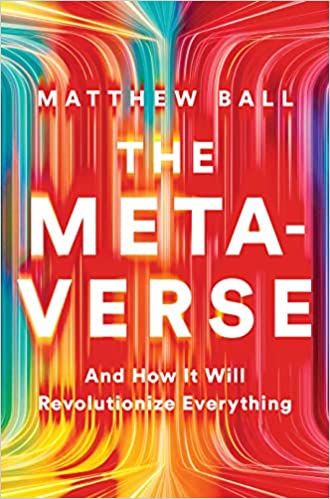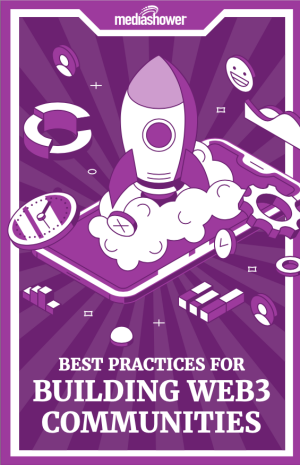
TLDR: The Metaverse is expected to expand over the next few years, with most people spending significant time in this “second reality” as soon as 2026. Businesses will also be moving into the Metaverse to sell and advertise products to new audiences.
So What? The Metaverse is a digital arena that will likely change how we shop, interact, work, and play. In our experience, most marketers know it’s a big deal, but they’re overwhelmed by the hype, and have no idea how to prepare for it.
The crash course: Read one book, and watch one video, and you will know everything.

1) Read Matthew Ball’s excellent series of essays on The Metaverse. Some are available for free on his website but get his New York Times-bestselling book for the full picture. This investment of time will make you more knowledgeable than 99% of your fellow marketers on the Metaverse.
2) Watch (or skim) the Meta announcement video. Everyone made fun of it, but Mark Zuckerberg does an amazing job explaining — and showing! — how the Metaverse will work. Since Facebook (now Meta) has the biggest bet riding on it, marketers need to understand where they’re headed.
What Is the Metaverse?
The Metaverse combines virtual reality (VR) and augmented reality (AR) into an immersive digital reality where users can interact digitally with other people, places, and things. As an analogy, think of the world before the Web (or imagine it, if you’re too young to remember). The Web has changed the world as radically as the Metaverse will.
Right now, many gamers use the Metaverse to access more realistic and captivating gameplay, but this will likely evolve into virtual workplaces, meeting places, entertainment and educational experiences, and much more. Just as the Web transformed the way we access data and interact with each other, the Metaverse will do the same — but instead of staring at screens, it will be a fully-immersive environment.
As in the real world and the internet today, there will be many opportunities in the Metaverse to market and sell products, both digital and physical. It will be up to businesses to develop new marketing strategies for selling products in the Metaverse and creating new digital products to sell for use in the Metaverse.
Here are some takeaways for businesses that want to expand their marketing into the Metaverse.
Get on Board With Blockchain
The digital world will come with a digital currency powered by blockchain (i.e., bitcoin). Digital currency is perfect for the Metaverse because it’s decentralized, so a company or provider won’t have control over people’s funds when they want to make purchases.
If your company doesn’t already have ways for people to use digital currency to buy products, this may be a good next step for preparing to do business in the Metaverse. Many third-party payment platforms like PayPal and Venmo are set up for transactions using digital currency, so this may be a good place to start.
The first step is educating yourself about why borderless, frictionless payment rails will be so necessary in the Metaverse: we recommend reading Matthew Ball’s take on it.
Look for Gaming Product Tie-ins
If your company wants to take its marketing into the Metaverse right now, gaming is the most obvious tie-in for marketing messages. Maybe one of your products could be a tool or accessory in a popular game. You could also buy advertising during gameplay or sponsor online gaming tournaments as a first foray into the Metaverse.
The sooner your company becomes part of the Metaverse, the easier it will be to expand your marketing strategy into this arena. There are many niche areas in the Metaverse even now, and product categories like EFTs, virtual clothing and accessories for avatars, and décor for virtual environments are rapidly growing as more people discover these new worlds. Gaming is the most obvious (but not the only) place to start.
The videogame Fortnite is perhaps the best example today of the Metaverse in action. We recommend learning how to play (it’s free!), and read The Metaverse for much more on why games are the leading edge.
Virtualize Your Customer Experience
These days, customer service can almost be a dirty word that stands for time-sucking activities like waiting on hold or typing questions in a chatbot. What if your company took customer service into the Metaverse with an immersive platform?
In your virtual customer service world, you could create environments that would put customers at ease, interact with them in personal face-to-face conversations, and resolve their concerns and issues more amicably than through antagonistic phone conversations.
Your company’s customer service department may not be ready to leap into the Metaverse yet, but it’s time to start preparing. For much more on this, watch Facebook’s massive Metaverse announcement video: it’s full of imagined examples of how this will play out.
Reach the Next Generation
You may not be marketing to 16-year-olds, yet. Many products are targeted toward older buyers, but to reach younger generations, it’s a good idea to think about how to engage when they’re teens entering the Metaverse, buying virtual goods from brands they’ll remember at age 25.
There are almost unlimited opportunities to create products in the Metaverse that can establish these branding experiences. Those experiences can then translate into real-world purchases. An investment in the Metaverse is an investment in the future of your business.
Create Communities
Just as your company may have created a community in the real world through events and on social media, it will be important to create virtual communities in the Metaverse to coalesce target audiences into a “tribe” around your brand or product.

Whether your company creates its own community in the Metaverse or joins one, it will give you a framework within which you can connect with a group of potential customers. Having access to these larger groups will help spread your messages in this new medium.
To learn more about creating online communities — both in the real world and the Metaverse — download our new ebook, Best Practices for Web3 Communities, based on interviews and research with real-world marketers building them today.